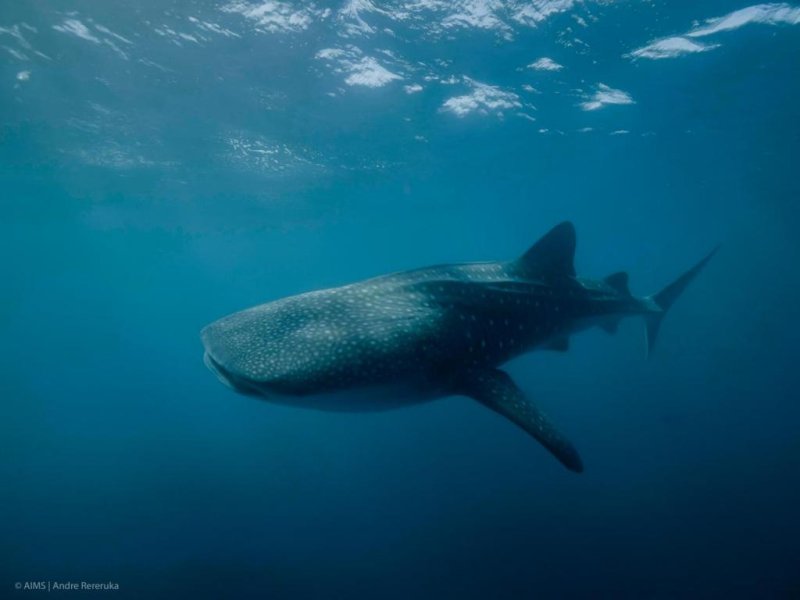
Whale sharks are the world's biggest fish species, and a decade-long survey of the animals shows that the biggest whale sharks are female.
Photo by Andre Rereuka/Australian Institute of Marine Science
Sept. 16 (UPI) -- Whale sharks are the biggest fish in the sea, and the biggest whale sharks are females, according to a study published Wednesday in the journal Frontiers in Marine Science.
For a decade, scientists measured the sizes and monitored the growth rates of male and female whale sharks, both in the ocean and in aquariums. The data showed males grow quickly earlier, but plateau just short of 30 feet.
Females, on the other hand, grow more slowly, but continue growing throughout adulthood, eventually surpassing males. Female whale sharks measured an average of 45 feet in length.
Between 2009 and 2019, researchers used a pair of underwater cameras to monitor the growth of 54 whales sharks along Western Australia's Ningaloo Reef. They used the unique spotting patterns on the backs of the whale sharks to identify and track individual fish.
Sept. 16 (UPI) -- Whale sharks are the biggest fish in the sea, and the biggest whale sharks are females, according to a study published Wednesday in the journal Frontiers in Marine Science.
For a decade, scientists measured the sizes and monitored the growth rates of male and female whale sharks, both in the ocean and in aquariums. The data showed males grow quickly earlier, but plateau just short of 30 feet.
Females, on the other hand, grow more slowly, but continue growing throughout adulthood, eventually surpassing males. Female whale sharks measured an average of 45 feet in length.
Between 2009 and 2019, researchers used a pair of underwater cameras to monitor the growth of 54 whales sharks along Western Australia's Ningaloo Reef. They used the unique spotting patterns on the backs of the whale sharks to identify and track individual fish.
RELATED Report: Oceans losing oxygen at rapid rate due to climate change, pollution
Over the decade-long study, the two cameras recorded thousands of whale shark measurements.
"It's basically two cameras set up on a frame that you push along when you're underwater," study co-author Brett Taylor said in a news release.
"It works the same way our eyes do -- so you can calibrate the two video recordings and get a very accurate measurement of the shark," said Taylor, a research fellow at the Australian Institute of Marine Science.
RELATED Study: Four new walking shark species discovered
According to biologists, there is a simple explanation for the gargantuan size of the female whale sharks -- they birth a lot of pups.
"Only one pregnant whale shark had ever been found, and she had 300 young inside her," said lead study author Mark Meekan, fish biologist at AIMS. "That's a remarkable number, most sharks would only have somewhere between two and a dozen."
Whale sharks remain threatened by targeted fishing and ship strikes, and researchers suggest their findings point to the importance of robust conservation efforts.
RELATED Great white sharks have been in Mediterranean for 3.2M years
"If you're a very slow-growing animal and it takes you 30 years or more to get to maturity, the chances of disaster striking before you get a chance to breed is probably quite high," Meekan said.
The latest findings also explain why biologists regularly find large congregations of young male whale sharks in the tropics.
"They gather to exploit an abundance of food so they can maintain their fast growth rates," Meekan said.
Earlier this year, Meekan and other researchers published an updated strategy for estimating the age of whale sharks using vertebrate ring growth rates. Their findings showed whale sharks can live upwards of 50 years.
"If you're a very slow-growing animal and it takes you 30 years or more to get to maturity, the chances of disaster striking before you get a chance to breed is probably quite high," Meekan said.
The latest findings also explain why biologists regularly find large congregations of young male whale sharks in the tropics.
"They gather to exploit an abundance of food so they can maintain their fast growth rates," Meekan said.
Earlier this year, Meekan and other researchers published an updated strategy for estimating the age of whale sharks using vertebrate ring growth rates. Their findings showed whale sharks can live upwards of 50 years.
No comments:
Post a Comment